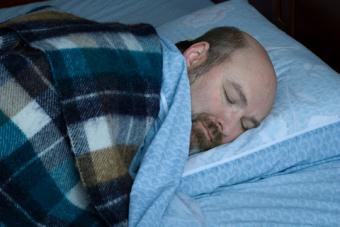
If you are among the many parents saying, "My child has ADHD and can't go to sleep," you may want to explore a possible connection between ADHD and sleep disorders.
What Is ADHD?
Attention deficit hyperactivity disorder (ADHD) is a prevalent neurobehavioral disorder typically diagnosed in childhood that often continues into adulthood. According to the Center of Disease Control and Prevention (CDC), there are three types:
- Predominately inattentive type (formerly ADD), characterized by disorganization, forgetfulness and distraction
- Predominately hyperactive-impulsive type, characterized by impulsiveness, fidgeting, and restlessness
- Combined type has symptoms of both types
If you're familiar with sleep disorders and sleep deprivation, you may see some similarities between the symptoms of ADHD and the symptoms of insomnia and sleep deprivation. Is there a connection between ADHD and sleep disorders?
My Child Has ADHD and Can't Go to Sleep
"My child has ADHD and can't go to sleep," is a common complaint, and there may be good reason that a child with this disorder may have difficulty falling asleep, and difficulty staying asleep. WebMd shares insight into a possible connection between sleep disorders and ADHD by citing a study that showed sleep related problems in children with the disorder:
- Difficulty sleeping
- Tired upon waking
- Nightmares
- Difficulty waking up
- Excessive daytime sleepiness
In addition, children with ADHD were reported to have sleep disorders like restless leg syndrome and sleep apnea.
Sleep Apnea and Snoring
Sleep apnea is a breathing disorder that makes the sleeper stop breathing in intervals throughout the night. When sleep apnea is present, sleep quality diminishes significantly, which can lead to excessive daytime fatigue, and the inability to stay focused.
While snoring is less severe than sleep apnea is, the condition can lead to poor quality of sleep. In some cases, the disturbances may lead to the symptoms of ADHD. One study found that children who snore were almost twice as likely to have ADHD than their non-snoring peers were.
Restless Leg Syndrome
When a person has restless leg syndrome (RLS), crawling sensations in the arms and legs lead to the overwhelming urge to move. The sleep disorder has ramifications that are quite similar to ADHD:
- Moodiness
- Inattention
- Daytime sleepiness
- Hyperactivity
Chronic Sleep Deprivation and ADHD
Some of the symptoms of ADHD may arise from chronic sleep deprivation and abnormal rapid eye movement (REM) sleep. The American Academy of Sleep Medicine explores sleep problems and ADHD. A study published in the journal SLEEP found children with the disorder slept fewer hours and experienced less REM than their non-ADHD peers.
While sleep deprivation is not necessarily a cause of ADHD, it can make the symptoms of the disorder worse. According to the National Sleep Foundation, sleep deprivation manifests differently in children than it does in adults. Children may become hyperactive when they are deprived of rest. Sleep deprivation may be confused with ADHD in children.
Improve Sleep to Lessen ADHD Symptoms
Getting a good night's sleep is good for your overall health, but it can be difficult to get enough rest when a disorder (whether sleep related or not) is present. ADHD is neurobiological, which makes it a pervasive problem that can affect different aspects of your child's life, including the ability to get adequate rest.
The lack of rest can exasperate the symptoms of ADHD, and taking steps to improve sleep may alleviate some of the symptoms. Blue-blocking glasses developed by scientists at John Carroll University have been found to lessen the symptoms of ADHD. The glasses kick the circadian rhythm into gear by blocking blue rays that prevent the flow of the sleep hormone, melatonin.
The first step is to talk to a doctor about any concerns about sleep disorders and ADHD. Your doctor may recommend a sleep study to determine whether a sleep disorder is present. In some cases, addressing the problem can lessen the symptoms of ADHD, which in turn, can lead to a better night's sleep.







